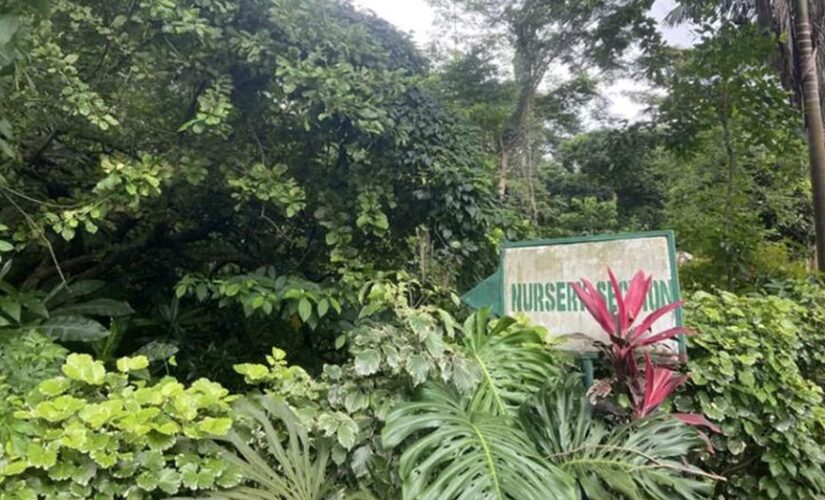As a herbal medicine practitioner in southwest Nigeria, Egunbiyi Yinusa has spent his life treating patients, using herbs and plants long plentiful and easy to find.
But when the traditional healer set out from his home in Oyo state last July in search of the root of the increasingly rare violet tree – used to treat sexually transmitted infections – he came back empty handed five hours later.
“I have not seen (it) in almost two years,” said Yinusa, who is in his sixties and learned the practice from his father when he was a teenager.
ILLEGAL ROAD IN BRAZILIAN AMAZON BRINGS THREAT OF FURTHER DEFORESTATION
Other medicinal plants, such as Cyanthula prostrate, locally called sawerepepe and used to treat asthma, are also much rarer.
“Now getting them requires going deep into the forests,” said Yinusa, explaining that sawerepepe had become much harder to find as a result of deforestation around the town of Oyo.
Over the past decade, Nigeria’s traditional medicinal plants have become far more scarce, according to practitioners and researchers, with forest losses, overharvesting and more extreme weather linked to climate change endangering vital species.
That presents a threat not just to the careers of traditional herbalists including Yinusa and the health of their patients – but to the country’s tradition and culture.
Traditional medicine is the main source of healthcare for 80% of the population – particularly in rural areas – according to Nigeria’s health ministry, and the World Health Organization (WHO) says the proportion is similar across sub-Saharan Africa.
Many Nigerians either cannot afford or are unable to access modern health services – which are often constrained by a lack of staff and funding – so at a community level they rely heavily on traditional medicine.
But the increasing scarcity of medicinal plants is driving up the cost of traditional healthcare for the public – while concerns are growing over the quality of alternative solutions.
“It’s a slippery slope … the increase in price (means) a lot of people can’t afford it, which is gradually reducing accessibility to healthcare,” said Adelodun Majekobaje, a doctoral researcher at U.S.-based Louisiana State University.
“(And) when a particular medicinal plant is unavailable, traditional doctors will go for an alternative which they have not actually tried to see whether it’s effective, thereby making herbal drugs less efficacious,” the forest science expert added.
Deforestation
In the city of Osogbo in Osun state – just east of Oyo – another traditional practitioner, Hossein Ajulo, said he had also been struggling to find the right plants in recent years.
There is “increasing difficulty to get herbs varies. There are some that I still struggle to get within the town,” said the 32-year-old, who has practiced traditional medicine for a decade and, like Yinusa, learned the trade from his family.
“I have to travel to get some now, or reach out to herb collectors outside, and this was not the case before,” he added.
Nigeria has more than 8,000 plant species with potential medicinal benefits, and data from the International Union for Conservation of Nature lists 15 plant species in the country as critically endangered, 18 as endangered, and 146 as threatened.
The main factor behind this is widespread deforestation driven by industrial development, followed by other drivers including the effects of climate change, said Adeniyi Jayeola, a botany professor at the University of Ibadan in Oyo state.
Between 2001 and 2021, Nigeria lost 2.8 million acres of tree cover, equivalent to an 11% decrease since 2000, according to Global Forest Watch, a monitoring and data platform.
In 2018, the Nigerian government said the country had lost 96% of its original forests due to deforestation.
Nigeria’s traditional medicinal plants have become rare to come across on account of deforestation. Pictured: The University of Ibadan’s botanical garden, one of the oldest in Nigeria on Sept. 27, 2022.
(Thomson Reuters Foundation/Adebayo Abdul Rahman)
But the problem facing medicinal plants is even more concerning than such data might suggest, Jayeola said.
“Even forests that are still there can no longer house a lot of medicinal plants because of habitat fragmentation, which is now very common across the continent,” he said, explaining that some plants cannot thrive in damaged forests.
Calls For Regulation
Several traditional medicine practitioners said the cost of obtaining herbal treatments had increased for them due to the scarcity of the plants and the rising costs of paying people throughout the value chain – from collectors to distributors.
“Though we try not to increase the cost of drugs and treatments because we believe we’re helping people … there is a very significant change in price,” Yinusa said, adding that the rise had been 50-100% on average over the last four years.
To address shortages, Shaba Meikudi, president of the National Association of Traditional Medicine Practitioners, said creating new botanical gardens could ensure that “we can raise these medicinal plants that are gradually being wiped away”.
Nigeria has 34 botanical gardens – which are mostly managed by universities and state agencies – to protect plant species.
However, Jayeola, who also heads up the botanical garden at the University of Ibadan – one of the oldest in Nigeria – said they are insufficient to tackle the medicinal plant shortage, and called for the introduction of “extractive gardens”.
Such gardens would be strictly designed for business purposes and used to raise endangered medicinal plants for traditional practitioners to buy, Jayeola said, adding that such gardens had proved effective in South Africa.
The academic also urged the Nigerian government to regulate the collection of plants in order to protect biodiversity.
CLICK HERE TO GET THE FOX NEWS APP
“If you go to the forests, you’ll see trees dying because some practitioners debarked them wrongly,” Jayeola said.
“Unless there are procedures that guide this process, the medicinal benefits of some plants will lead to their death.”




